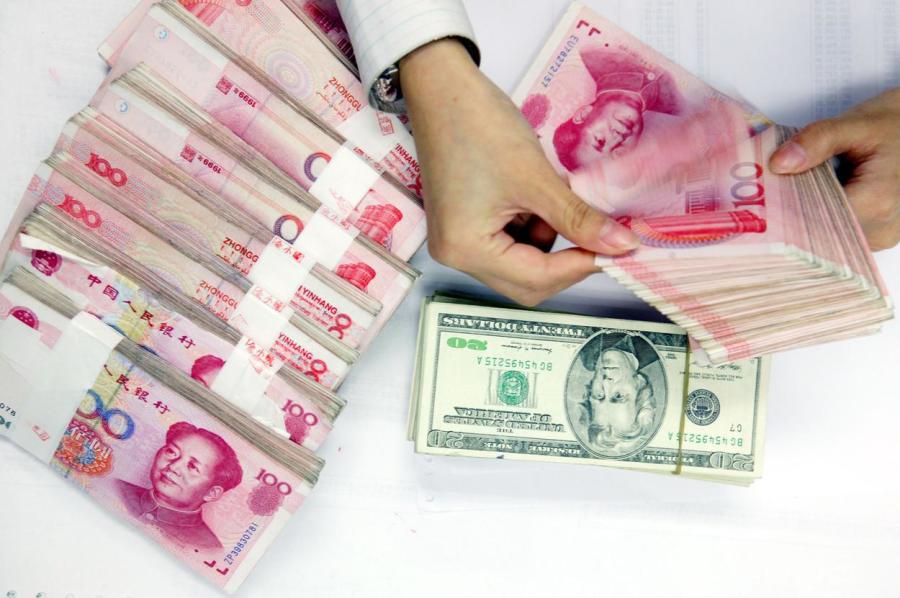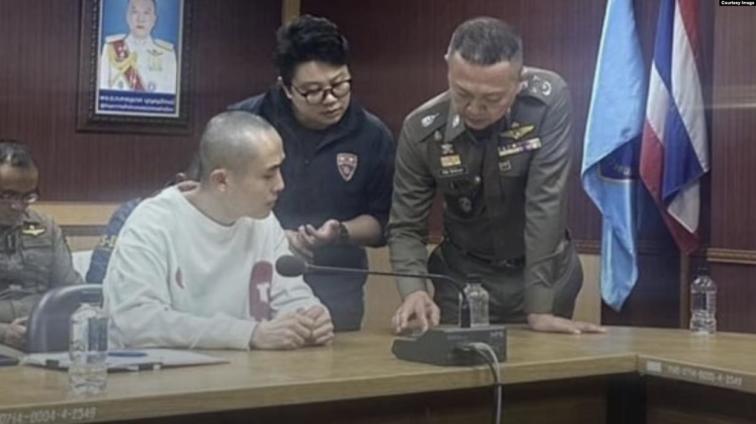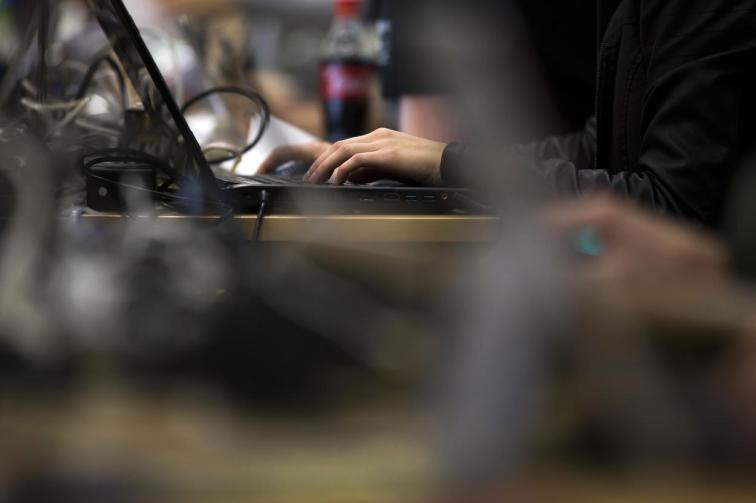As the U.S. Dollar Index continues to strengthen in recent days, the RMB exchange rate against the U.S. dollar continues to decline. Stacks of RMB and U.S. dollars. (Getty Images)
People News - On January 12, Pan Gongsheng, Governor of the People’s Bank of China, stated at the 18th Asian Financial Forum, "We will significantly increase the country’s foreign exchange reserves and create broader opportunities in the asset allocation sector in Hong Kong to support Hong Kong’s financial development." He added, "We will explore expanding the central bank’s macroprudential and financial stability functions, coordinate with Hong Kong’s financial authorities, and support the healthy development of capital markets in both the mainland and Hong Kong." Pan expressed confidence in maintaining stability in the foreign exchange market.
Since 1983, Hong Kong has implemented a linked exchange rate system, pegging the Hong Kong dollar to the US dollar at a fixed rate of HKD 7.8 per USD. The total foreign exchange reserves of Hong Kong’s central bank are several times the currency in circulation in the market. In theory, as long as foreign exchange reserves are equivalent to the monetary base, they are sufficient to safeguard the Hong Kong dollar’s liquidity and stability. Thus, Hong Kong’s reserves are adequate, and there is no need for China’s national foreign exchange reserves to intervene. So, what underlying message does Pan Gongsheng’s statement convey?
When it comes to CCP rhetoric, one must often interpret it in reverse. Instead of protecting Hong Kong’s financial stability, the CCP likely intends to strongly intervene in Hong Kong’s financial market to prevent the offshore renminbi (RMB) exchange rate from falling too sharply or deviating significantly from the onshore rate. This would guard against arbitrage opportunities and international capital shorting the offshore RMB. At the same time, Beijing likely aims to tap into Hong Kong’s foreign exchange reserves under the guise of "protecting" Hong Kong’s financial development. As the saying goes, "It’s not the theft that’s worrisome—it’s the thief eyeing the prize."
It is well-known that the RMB is not a freely convertible currency and is subject to CCP control, with individual foreign exchange transactions capped by quotas. The CCP wants to have it both ways: to control the RMB market while simultaneously pushing for its internationalization to align with global standards and challenge the US dollar's status as the world’s reserve currency. To achieve this, the CCP has implemented a dual exchange rate system. The first is the offshore RMB, used for international settlements, with offshore financial centers established in Hong Kong, Singapore, and London to attract global investors. The second is the onshore RMB exchange rate, strictly controlled by the CCP. A daily reference rate (central parity rate) is set for the onshore RMB, with a trading band limiting fluctuations to within 2% above or below the previous day’s rate.
Offshore RMB is market-driven, entirely subject to market fluctuations. In contrast, onshore RMB is directly controlled by the CCP. The exchange rates of the two are inherently different: the former is unstable, while the latter is relatively stable. However, a significant disparity between the two creates problems. On one hand, capital exploits the arbitrage opportunity from the exchange rate gap; on the other hand, offshore RMB risks being shorted, which damages the CCP’s image, destabilizes financial markets, and accelerates capital flight, ultimately impacting macroeconomic policies and economic development.
Economics tells us about the "Mundell Trilemma," or the "impossible trinity," which states that a country cannot simultaneously maintain capital mobility, monetary policy autonomy, and a fixed exchange rate. Pursuing all three leads to financial crises. Hong Kong maintains a fixed exchange rate pegged to the US dollar, meaning its monetary policy is dictated by the US. The Federal Reserve adjusts its interest rate policy based on market reactions and expectations.
The CCP, however, wants it all. To revive a sluggish economy, it lowers interest rates; it seeks a stronger RMB to attract foreign investment and curb capital flight, while also devaluing the currency to offset US tariffs, particularly as Donald Trump prepares to reintroduce trade tariffs.
On January 3, the onshore RMB fell below 7.3 against the US dollar for the first time since 2023, while the offshore RMB dipped below 7.34. On January 15, the US Labor Department reported December 2024 CPI data showing year-over-year growth of 2.9%, aligning with expectations. Core CPI growth held steady at 3.3% year-over-year since September 2024. Month-over-month growth remained at 0.3% for four consecutive months, slightly declining in December, dampening expectations of a Federal Reserve rate cut. With a strong US dollar, China faces an inverted interest rate differential and accelerated capital outflows.
On January 13, China’s General Administration of Customs released 2024 trade statistics (USD-based): the trade surplus, calculated as exports minus imports, was $992.1 billion, up from $608 billion in 2023—a net increase of $384.1 billion. Yet, foreign exchange reserves decreased by $35.6 billion to $3.2024 trillion in 2024.
Why did foreign exchange reserves shrink despite a larger trade surplus? Three reasons explain this: RMB Depreciation: This reduced the value of foreign reserves while increasing external debt repayment costs. Gold Purchases and US Treasury Reductions: China reduced US Treasury holdings by $11.9 billion as of October 2024 and increased gold reserves to 2,271 tons, a 46% rise over two years. Foreign Capital Flight: This is the most concerning and undesirable scenario for the CCP.
To curb capital flight, the CCP has launched a battle to defend the RMB. Recent measures include: Central Bank Bills in Hong Kong: On January 9, the People’s Bank of China announced plans to issue RMB 60 billion worth of central bank bills in Hong Kong, the largest single issuance to date. This pushed overnight CNH HIBOR rates above 8%, and the offshore RMB rebounded by over 150 points from its low.
Cross-Border Financing Policy: On January 13, the central bank raised the macroprudential adjustment parameter for cross-border financing from 1.5 to 1.75, allowing companies to purchase more US dollars, increasing domestic dollar liquidity to support the RMB.
Another example is Pan Gongsheng's speech in Hong Kong. In November 2020, the People’s Bank of China and the Hong Kong Monetary Authority (HKMA) renewed a five-year currency swap agreement. The scale of the agreement was expanded from RMB 400 billion / HKD 470 billion to RMB 500 billion / HKD 590 billion. In July 2022, this swap agreement was converted into a standing arrangement, meaning it no longer requires renewal. The scale was further increased from RMB 500 billion / HKD 590 billion to RMB 800 billion / HKD 940 billion. What does this mean? It means the Chinese central bank can exchange RMB for Hong Kong dollars, allowing China to extract approximately $120 billion in foreign exchange from Hong Kong annually. Since the agreement is now permanent, it does not need renewal, effectively making it indefinite. This indicates that China is experiencing a foreign exchange shortage and is severely lacking foreign capital.
Recently, both foreign and Chinese media have reported that Foxconn in Henan has been subjected to "capital control," with the CCP preventing mainland Foxconn workers and funds from moving to India or Singapore. Foxconn has effectively been taken hostage by the CCP. It’s too late for Foxconn to flee now. At its peak in 2013, Foxconn employed 1.3 million workers in China. Over the past few years, the company has gradually withdrawn, leaving only 300,000 employees. Losing one million jobs has undoubtedly alarmed the CCP. Rumors suggest that many foreign and Taiwanese businesses now want to leave but are unable to, as the CCP is not allowing them to exchange foreign currency or transfer their assets abroad.
On January 15, Vanke, a leading Chinese property developer, saw its CEO, Zhu Jiusheng, detained by police. This signals further turmoil in the real estate sector, amplifying local government debt and financial risks. In 2025, China’s economy will likely face greater instability, posing even graver challenges for the CCP.
(People News Exclusive)










News magazine bootstrap themes!
I like this themes, fast loading and look profesional
Thank you Carlos!
You're welcome!
Please support me with give positive rating!
Yes Sure!